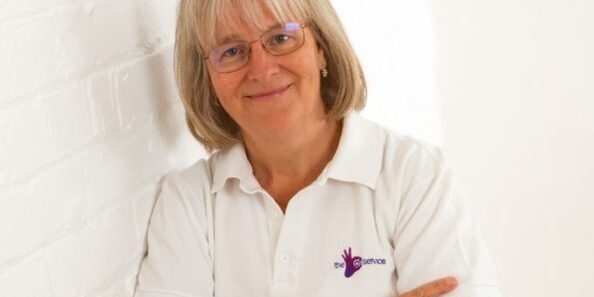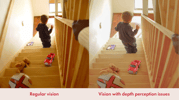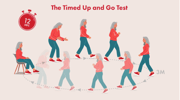
It’s important to feel confident in your abilities, no matter your age. Our treasured occupational therapist from The OT Service, Kate Sheehan, shares her advice for maintaining or regaining your confidence in later life.
The dictionary defines confidence as ‘the quality of being certain of your abilities’; some say it’s the feeling of and the belief that you can do something and succeed – but we need confidence to be able to carry out all our daily activities and provide meaning and purpose in life.
Lockdowns during the pandemic had a significant influence on our confidence and we are now only just realising the long-term effects on the health and well-being of our older population and in particular the impacts on their physical health because of reduced activity.
A study published by Public Health England in August 2020 found that 32% of older people were inactive (less than 30 minutes of moderate activity per week) between March and May 2020 and the average duration of strength and balance activity decreased from 126 to 77 minutes per week in the same period.
In addition, the report stated that older people experienced a considerable reduction in strength and balance activity, with the greatest change in 70–74-year-olds. The wider impact of this inactivity has resulted in increased numbers of older people now experiencing what is described as deconditioning syndrome. Deconditioning is a syndrome of physical, psychological, and functional decline that occurs as a result of prolonged inactivity and associated loss of muscle strength, which is having a detrimental effect on older people’s mobility and confidence, preventing them from returning to previous levels of engagement in social activities.
Reduced confidence and mobility are closely linked and can exacerbate one another. A loss of confidence can lead to a loss of mobility and with a loss of mobility comes a further loss of confidence, resulting in a cycle of deterioration which can be difficult to break.
However, it’s important to note that we can improve our confidence in our mobility, balance and strength by following my top tips:
Set personal goals
This is all about you. What do you want to achieve? It could be one thing or a long list, whatever you do make them achievable and if necessary, break the end goal into bite-size pieces to achieve those goals.
For example, your goal could be to walk to have a coffee with friends at a local café. The distance to the venue may be too much to do straight away, so think about building up your walking capability by doing short walks each day, increasing the distance a little each time; get the bus or taxi there and walk back or look at finding a rest point halfway, or call a friend to pick you up halfway back.
Another goal could be returning to the exercise class you did prior to the pandemic or walking to the local pub or the knit and natter group or the bingo session or walking to meet a friend for lunch. All of them involve building up your confidence in walking again.
Identify what is causing your reduced confidence
Try to acknowledge what is causing your lack of confidence in your walking ability - is it the fear of tripping and falling, is it the lack of wanting to use mobility equipment (even though this might help as a tool to improve your gait or skills), is it a psychological barrier, such as telling yourself you cannot walk far (and therefore you don’t walk far) or is it the fear of going out after such a long period in isolation?
Understanding these influences will help you confront them and do seek help where necessary to address the issues.
Take regular exercise
It’s never too late to start or increase your physical activity. You may wish to start with simple chair exercises or simply walk out to greet your neighbour; the key is to remember to increase the distance you walk each week, which in turn will improve your stamina and confidence.
Use items around your house to boost your balance, like the back of a dining chair for support and lift one of your legs off the floor. Once you are comfortable, do this without the support of the chair. Use a couple of tins of food and do upper limb exercises, raising the tins to your side and front to tone your muscles.
Seek out exercise groups for older people - most Local Authorities run these at leisure centres or community halls - if you feel anxious about going alone, invite a friend to join you.
Immerse yourself in social activities
Reengage with the social activities you loved prior to the pandemic and spend time with loved ones. Why not take up or return to volunteering? The evidence is clear that those older people who volunteer live longer and have better health outcomes.
Spending time with others really can improve your confidence and before you know it you will be doing more and improving your mobility, strength and balance without even realising.
Get psychological and physical support
Talking about your concerns and seeking help is so important. Ask your GP if they have a social prescriber that could assist you back to suitable activities or ask for a referral to the reablement service or a community physiotherapy service. It could be that you would benefit from some psychological support, so ask about local counselling options.
Your confidence in your mobility will return if you start with small steps to improve your strength and balance. In turn, your mobility will improve and enable you to return to attending the social activities you love, the hobbies you enjoy, the volunteering that gives you meaning and purpose and the by-product is your improved physical and mental well-being.
Keep enjoying the activities you love and keep on being you.
Sleep can also have a large impact on your physical health – and you’re likely to lack confidence if you can’t get a good night’s sleep. Kate teams up with our psychologist Jo Hemmings to offer their tips on improving your sleep hygiene to get the best sleep.
Stay up to date
Latest Blogs

Whole Home Comfort with Stannah and HSL

Dame Zandra Rhodes x Stannah: When accessibility meets style
Could more people benefit from home adaptation support for hidden disabilities?
50 years of Stannah Stairlifts – A milestone grounded in purpose

BBC’s Dr Punam Krishan reveals a little-known Parkinson’s symptom to watch for...

Are you at risk of falling? Dr. Punam Krishan’s simple 12-second test could tell you...

Snore Wars: Could sleeping separately be the secret to a better night’s rest?

Proud to carry the Made in Britain mark!
Stairlifts made for you
All our stairlifts whether straight or curved are customised to suit you and your home so call now to arrange a visit to get your FREE personalised quote!